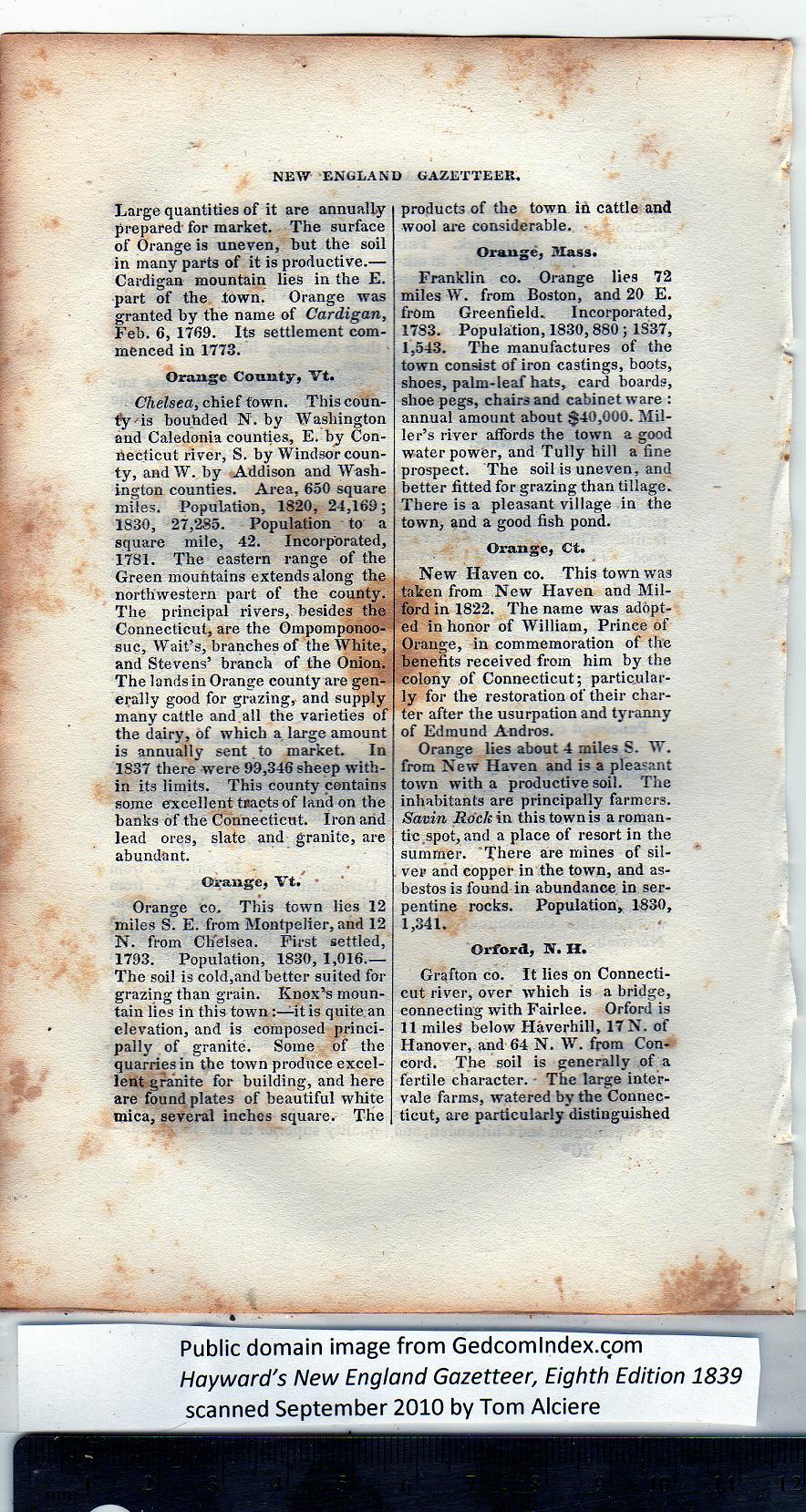|
Large quantities of it are annually
prepared for market. The surface
of Orange is uneven, hut the soil
in many parts of it is productive.—
Cardigan mountain lies in the E.
part of the town. Orange was
granted hy the name of Cardigan,
Feb. 6, 1769. Its settlement com-
menced in 1773.
Orange County, Vt.
Chelsea, chief town. This coun-
try'is bouhded N. by Washington
and Caledonia counties, E. by Con-
necticut river, S. by Windsor coun-
ty, aadW. by Addison and Wash-
ington counties. Area, 650 square
miles. Population, 1820, 24,169;
1830, 27,285. Population to a
square mile, 42. Incorporated,
1781. The eastern range of the
Green mountains extends along the
northwestern part of the county.
The principal rivers, besides the
Connecticut, are the Ompomponoo-
suc, Wait’s, branches of the White,
and Stevens’ branch of the Onion.
The lands in Orange county are gen-
erally good for grazing, and supply
many cattle and all the varieties of
the dairy, of which a large amount
is annually sent to market. In
1837 there were 99,346 sheep with-
in its limits. This county contains
some excellent tracts of land on the
hanks of the Connecticut. Iron and
lead ores, slate and granite, are
abundant.
Orange, Vt.
Orange co. This town lies 12
miles S. E. from Montpelier, and 12
N. from Chelsea. First settled,
1793. Population, 1830, 1,016—
The soil is cold,and better suited for
grazing than grain. Knox's moun-
tain lies in this townit is quite an
elevation, and is composed princi-
pally of granite. Some of the
quarries in the town produce excel-
lent granite for building, and here
are found plates of beautiful white
mica, several inches square. The
products of the town in cattle and
wool are considerable. |
Orange, Mass.
Franklin co. Orange lies 72
miles W. from Boston, and 20 E.
from Greenfield. Incorporated,
1783. Population, 1830,880 ; 1S37,
1,543. The manufactures of the
town consist of iron castings, boots,
shoes, palm-leaf hats, card hoards,
shoe pegs, chairs and cabinet ware :
annual amount about §40,000. Mil-
ler’s river affords the town a good
water power, and Tully hill a fine
prospect. The soil is uneven, and
better fitted for grazing than tillage.
There is a pleasant village in the
town, and a good fish pond.
Orange, Ct.
New Haven co. This town was
taken from New Haven and Mil-
ford in 1822. The name was adopt-
ed in honor of William, Prince of
Orange, in commemoration of the
benefits received from him by the
colony of Connecticut; particular-
ly for the restoration of their char-
ter after the usurpation and tyranny
of Edmund Andros.
Orange lies about 4 miles S. W.
from New Haven and i3 a pleasant
town with a productive soil. The
inhabitants are principally farmers.
Savin Mock in this town is a roman-
tic spot, and a place of resort in the
summer. There are mines of sil-
ver and copper in the town, and as-
bestos is found in abundance in ser-
pentine rocks. Population, 1830,
1,341.
Orford, N. II.
Grafton co. It lies on Connecti-
cut river, over which is a bridge,
connecting with Fairlee. Orford is
11 mileg below Haverhill, 17 N. of
Hanover, and 64 N. W. from Con-
cord. The soil is generally of a
fertile character. The large inter-
vale farms, watered by the Connec-
ticut, are particularly distinguished |
